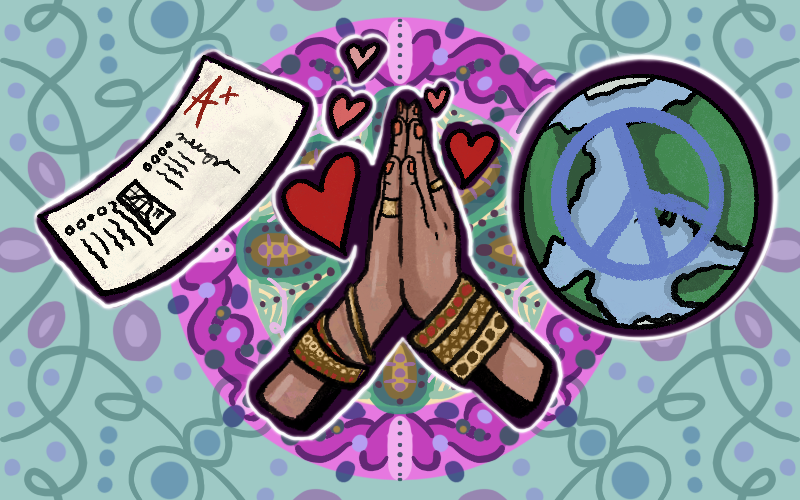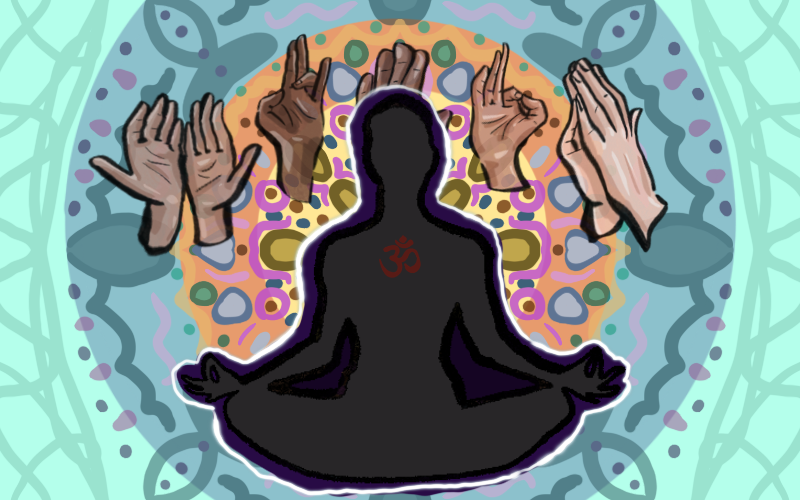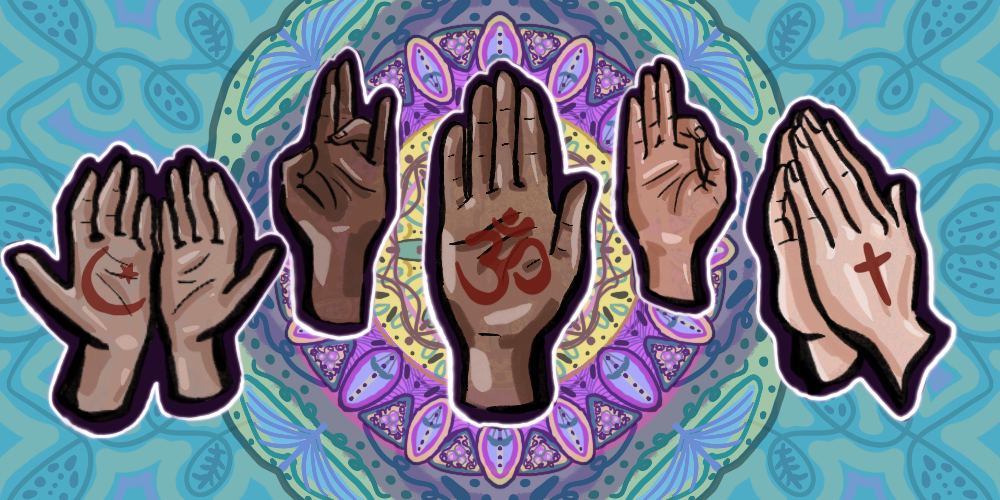“Mugdha Singh,” I said, when the nun at the head of the class asked my name. I was all of six years old and freshly out of kindergarten. I had followed some of my classmates and found myself in a catechism class. The nun, raising an eyebrow at the evidently non-Catholic-sounding name, asked me to walk up to her and then gently took me back to my non-Catholic classroom.
It is not easy for me to recall what made me go and sit in the catechism class at the time, but I vaguely remember wanting to escape whatever was happening in my classroom. And when I realized that a bunch of my friends were being allowed to leave class, I happily followed. Nobody made a big deal of it, even though my older sisters told me that the incident was spoken of at the seniors’ morning assembly. At home, everyone laughed it off.
That was the first time I saw the world as us and them. My six-year-old brain did not know what to make of religion, my 35-year-old brain still doesn’t.
Over the years, I learned that the world was divided not just into people who could attend the catechism class and those who couldn’t, but into people who wore a certain headgear and those who didn’t, people who prayed with open palms and those who joined them together.
I was born a Hindu; it says that on all my official documents. Every time a form asked me my religion, I wrote Hindu more as a reflex action than anything else. Much like everything about me being a Hindu was. An action done without any conscious thought.
It was an inheritance, rather than a philosophy. I grew up following and celebrating all Hindu festivals. Imitating my elders when they sang aartis, blew conch shells, lit incense sticks. I saw how others moved their palms thrice over the aarti flame, in a clockwise motion and then touched them to their foreheads, so I learned to do the same. Most of what we understand as religion, or at least the rituals, are passed on to kids by imitation. Done over many years it becomes a habit. And yet I have always been a little wary of this habit, never feeling quite comfortable in my Hindu-ness.
“Avoid discussing two things in public: religion and politics,” my mother often reminded us. I once mindlessly asked her why and she said, “people feel very strongly about these two subjects in their lives, and a disagreement can very quickly lead to an argument. These themes have the power to really rile people up and can end in unpleasant situations.” I did not know it then, but this caveat came from a place of wanting to protect her girls in a society that did not necessarily take kindly to girls having their own opinions, especially not on serious topics such as religion or politics. I chewed on my mother’s words and thought to myself, what kind of religion makes you want to fight with people? I didn’t know better. My limited worldview told me that religion was a good force, something that brought people together. What I did not know was that it was also a cause of death and destruction in the world.
When I realized the flip side of religion, it distanced me further from mine. I wanted to be a bad Hindu just because all the good Hindus seemed to be interested in putting other faiths down and even killing in the name of Hinduism. Year after year, countless deaths take place in the name of religion. German philosopher and sociologist in the tradition of critical theory and pragmatism, Jürgen Habermas, used to believe that the rationalization of society would eventually lead to the disappearance of religion from the public sphere. Sadly, that does not seem to be true; even Habermas has altered his viewpoint.
In the recent past, cases of cow lynching by fringe-Hindu groups resulting in deaths of Muslims and Dalits gave rise to the #NotInMyName protests across India, where liberal Hindus sought to reclaim their religion from those who believed themselves to be heir to the gods themselves.
•
My parents were practicing Hindus, with daily poojas, a sandhya poojan (evening prayer), vrats (fasts) etc., and yet they never asked any of their offspring to follow suit. Only one of my three sisters took to praying daily and stuck with it for a long time, of her own volition. The rest of us always felt a little indifferent to the whole thing.
It’s not like I didn’t pray. I prayed so that I could pass my yearly exams, I prayed for my crush to notice me, and I prayed for world peace. I didn’t pray to a god, or one deity; it was just a wish that I sent out into the universe hoping and believing that one of the many gods in Hinduism would pick it up and see if it was worth answering. I did pass all my annual exams, my crush did take notice of me, as for world peace, well.

In an attempt to make sense of this feeling of ambivalence, I turned to the World Wide Web. I hoped that someone out there felt the same way as I did about not really wanting to practice my religion and yet not feeling strongly enough to fully distance myself from it.
There are gems after gems of insights and opinions and musings by brilliant minds available online. I resonated with something that Indian philosopher, poet, and Nobel laureate Rabindranath Tagore said in a conversation with Albert Einstein. They met in Berlin in July 1930 and had a stimulating conversation on religion and science. After a volley of ideas, Tagore said to Einstein, “My religion is in the reconciliation of the Super-personal Man, the universal human spirit, in my own individual being.” It made sense; our worlds are created within our minds, why should our relationship with God be any different? In a way, the millennial expression, “you do you,” could be applied to religion as well.
In an ideal world, there would be as many ways to practice your faith as there are human beings. Instead, what we have currently is a handful of major religions dictating how one should go about it. Faith is subjective and it is deeply personal. For instance, I didn’t realize how religiously inept I was until my surviving parent, my father, passed on three years ago, leaving us with a pooja ghar — a temple within the house — to look after. Sure, I knew what I needed to do; enter barefoot, join my palms, bow my head, say a little prayer, and light an incense stick. Easy. In and out in two minutes, but I did not have the inclination to do it daily. I worried if this would anger the gods, but I reminded myself that gods, or at least my gods, could be reasoned with. My cousin, on the other hand, who grew up in the same house, was exposed to the same things I was, does a pooja daily that lasts two hours. I have Muslim friends who don’t read the Namaaz five times a day. And Sikh friends who cut their hair. And Catholic friends who don’t observe Lent. Neither of us is a lesser human being because we don’t pander to religious dogma.
It is only when organized religion puts the filter of morality to customs and practices that it starts becoming a problem for me. As long as it dictates your personal morality and devotion, it is fine, but when you start expecting everyone else to follow your example, that is when it starts to infringe on another’s personal liberty. I think organized religion uses guilt as a ploy to seep further into society. It sells you the idea that you are not good enough if you are not God-fearing. But should we fear God in the first place? If indeed the concept of God exists in our mind, then it is our personal moral compass, made up of our lived experiences, that actually guides us in our endeavor to live a loving and compassionate life. And in this way, would it not be better if we were self-fearing than God-fearing?
In one of his essays in The Pleasure of Finding Things Out: The Best Short Works of Richard P. Feynman, the American theoretical physicist says, “In the end, it is possible to doubt the divinity of Christ, and yet to believe firmly that it is a good thing to do unto your neighbor as you would have him do unto you. It is possible to have both these views at the same time.” And I am not even doubting the divinity of Christ or Brahma. I am merely ruminating the possibility of us creating our own gods, and hence creating our own religion.

As much as I grew comfortable with the idea that our gods are within us, I realized I needed one God, someone or something definitive, outside of me, to direct my anger toward when I lost my mother to an aggressive cancer. I wanted to end whatever semblance of a relationship I had with the gods, even if it was all inside my head. Grief makes you do these things; it makes you want to do something, anything that will shift the status quo. Her cremation was done in a traditional Hindu manner, as she would have wanted.
It was during the rituals of the 13 days of mourning that it dawned on me that these elaborate customs exist to help survivors process their grief. We need the pacifying and the soothing and the distraction of it all. Could it be true of all the rituals that different religions ask us to follow? It was around then that I started feeling less guilty about not knowing the correct way to do an aarti, or not knowing the right way to pronounce a particular mantra. Organized religion makes such a fuss about not doing things in accordance with its rules and scriptures that it is easy to forget that it all boils down to keeping faith.
Even though I did not subscribe to their model of practicing faith, I acknowledged that my parents drew a lot of strength from their belief in a higher power. My mother found great solace in it; she even went on a chaar dhaam pilgrimage as a Hindu is wont to do. My father credited every single success and joy in his life to his unwavering belief in his gods. He never missed an opportunity to express his gratitude to them. I could see it clear as day that it did something for them, steadied them in a way, much like an anchor does to a ship.
One of my friends’ mothers, a Syrian Christian married to a Hindu, once lamented to my friend that she felt guilty about not having given her children the power and security of faith. Because they grew up in an inter-faith household, they followed both and neither at the same time. My friend told her mother that she and her father had raised three good human beings and that was what mattered. Goodness will be their religion and they will always draw strength from it. I wish more families had this kind of dialogue about religion.
•
As things stand today, I’ve started believing more and more in the power of gratitude, kindness, compassion, the cosmos, the goodness of people. It is different things on different days. I definitely feel a shift in energy when I enter places of worship, no matter the religion to which they belong. Moreover, my belief that whatever I ask for will be answered sooner or later is always strong, whether I am at a church, a gurdwara or a temple.
I am no longer puzzled by people who practice their faith in a peaceful, non-intrusive way. I don’t feel like asking them “what good is an education if you are going to believe in a stone?” It is their private affair, and I’ve learned to respect it instead of questioning it. I am also strongly of the opinion that it is the power of their conviction, the faith that they put in their gods, or a higher power, that makes miracles happen.
I have surrendered to the thought that instead of carrying it around as an invisible weight, one needs to put down one’s faith in something. The world in all its vastness is too awe-inducing to comprehend otherwise.
Over the years, I have realized that my dissonance is not the result of religions per se, but because of the practitioners of these religions. It is the interpreters of scriptures and holy books whom I have a grouse against. I dream of a world where all religious writings are made accessible to all, and everyone is encouraged to interpret them in their own way, no matter which religion they subscribe to.
In a letter he wrote to the Grand Duchess Christina of Tuscany, Italian astronomer and physicist Galileo made the following observation: “People who are unable to understand perfectly both the Bible and the science far outnumber those who do understand them . . . it is much more pleasant to gain a reputation for wisdom without effort or study than to consume oneself tirelessly in the most laborious disciplines.” If we continue to blindly follow the rituals and practices as advertised by God-fearing men, without ever attempting to understand their meaning or context, then we are taking the easy way out.
When I think of the catechism class episode, I often think of it as a metaphor for how people sometimes use religion as an escapist tool. Just as I followed my friends out of the room to escape my class, some of us turn to religion to escape from whatever is happening in our lives.
I can’t say what will happen to these thoughts of mine in the future, but for now, I am happy to interpret my religion and those of others around me and learn the best lessons that each has to offer. I can celebrate a day of Thanksgiving or ask for forgiveness from everyone around me as followers of Jainism do, “Micchami Dukkadam.” Alain de Botton explains this concept in poignant detail in his book, Religion for Atheists: A Non-Believer’s Guide to the Uses of Religion: “The choice isn’t between religion and the secular world, as it is now — the challenge is to learn from religions so we can fill the secular world with replacements for the things we long ago made up religion to provide. The challenge begins here.” With everything that is happening around the world, are we up for the challenge? •




